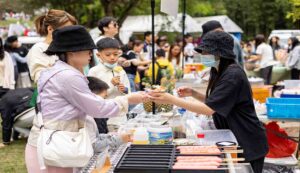Chinese shoppers are once again flocking to Hong Kong stores
The Mainland Chinese consumers are returning to Hong Kong retailers, but this time they are buying sanitary towels and other feminine hygiene items instead of Yakult beverages, cooking oil, or baby formula.

Concerns over allegations of tainted and discolored cotton stuffing in comparable items offered in mainland China are the major cause of this change in consumer behavior. According to Radio Free Asia, these safety concerns have caused many customers to look for alternatives in Hong Kong, where the quality is seen to be more dependable.
In an interview with Radio Free Asia, a Guangzhou customer said that since Hong Kong’s sanitary items are guaranteed to exceed safety regulations, she felt more comfortable purchasing them. “I’m not as worried about using them,” she said.
Another customer, who asked not to be named, reportedly complained about the quality of mainland Chinese sanitary towels and said she no longer buys them there, preferring to buy them in Hong Kong.
Over 340 million women in China between the ages of 15 and 49 use sanitary napkins, and the country’s sanitary napkin business is worth about 98 billion yuan (USD 13.4 billion).
However, a lot of mainland Chinese women still have misgivings about locally produced feminine care products. This mistrust is a result of a number of recent public health disasters involving Chinese corporations, including cadmium-contaminated rice, recycled “gutter” cooking oil, melamine-tainted milk, and Sudan Red contamination in food.
In a recent interview with RFA, a Shenzhen resident who only provided her surname Shen out of fear of reprisals said, “It’s a trending topic on Douyin right now that some sanitary towels aren’t long enough.”
“Some are said to be unsanitary, with fillings that appear black when light is shone on them.”
According to the article, the government-backed media source The Paper tested 24 different brands after complaints appeared on social networking sites like Douyin and Xiaohongshu. It found that 88% of them were at least 0.4 inches (a centimeter) shorter than their claimed length. A variance of 10 to 15 millimeters may be explained by the 4 percent disparity allowed by Chinese industry norms, indicating that these differences might not be unlawful.
According to RFA, social media users have tested Chinese-made feminine care products in private labs and found that many of them had the wrong pH levels or high concentrations of dangerous chemicals and germs. These problems may have a negative impact on women’s health and result in diseases including pelvic inflammatory disease and bacterial vaginosis.
Due to these discoveries, a large number of women are searching social media for “safe” goods, which has resulted in an increase of vendors claiming to sell sanitary items manufactured in Japan and Hong Kong.
Sanitary goods sold in shops like Watson’s in Hong Kong are often produced in Japan or Hong Kong, where safety regulations are much more stringent.
A customer support agent from ABC, a company that manufactures feminine goods, informed a disgruntled client in one social media video, “If you don’t think this is acceptable, you don’t have to buy them.”
The goods were taken off the shelves of the company’s main Tmall shop after social media users expressed their indignation.
According to many media outlets, ABC has apologized for its “inappropriate” customer care response, and other Chinese businesses have issued public apologies.





